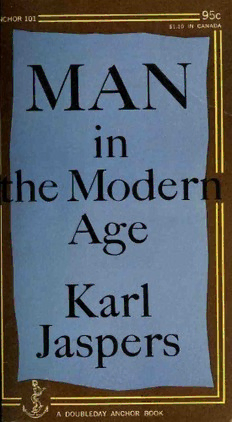Table Of ContentJCHOR 101
MAN
in
Moder
he
Age
Karl
Jaspers
A DOUBLEDAY ANCHOR BOOK
Digitized by the Internet Archive
in 2011
http://www.archive.org/details/maninmodernageOOjasp
MAN IN THE MODERN AGE
Karl Jaspers is a German existentialist philosopher,
born in 1883. In 1908 he received his M.D., but he
turned later from medicine to philosophy. He began
his long association with the University of Heidelberg
in 1913, and three years later became professor of
philosophy there. He was forced by the Nazis to leave
the university in 1937 but returned in 1945. Since 1948
he has been professor of philosophy at the University
of Basel, Switzerland.
A number of Jaspers' other books are available in
Englishtranslations. Among these are: Perennial Scope
of Philosophy, Existentialism and Humanism, Way to
Wisdom, European Spirit, Reason and Anti-Reason in
Our Time, The Origin and Goal of History, Tragedy Is
NotEnough, and Reason and Existence.
Man in the Modern Age was first published in Ger-
man in 1931. This edition is a revision of the original
English translation (1933) and was published in hard-
covers in 1951 by Routledge & Kegan Paul Ltd., Lon-
don.
MAN
IN
MODERN
THE
AGE
Karl Jaspers
TRANSLATED BY
EDEN AND CEDAR PAUL
Doubleday Anchor Books
Doubleday & Company, Inc.
Garden City, New York, 1957
COVER BY SYDNEY BUTCHKES
TYPOGRAPHY BY EDWARD GOREY
Reprinted by arrangement with
Routledge & Kegan Paul Ltd.
Printed in the United States of America
FOREWORD TO THE NEW IMPRESSION
This book was written in 1930. At that time I had
scarcely any knowledge of National Socialism, though
rather better acquainted with Fascism. While still re-
joicing over the completion of my manuscript, I was
amazed and shocked when I heard of the first success
ofthe National Socialists in the September elections of
1930. Themanuscriptwas putasideforayear, as I did
not wish it to appear before the three volumes of my
Philosophy, which werepublishedin 1931; the present
workwas publishedafewweeks later.
To elucidate that period I made use of facts which
belong to those particular years, and in many respects
thebookhas the atmosphere of the time. On consider-
ing, however, the philosophical situation and the state
oftheworldto-day, itseemedto me thatthe bookwas
as valid now as then, in spite of all that has happened
sinceits first appearance.
To attempt even the slightest alteration would now
seem to me a falsification. This new impression of the
translation ofthefifthGerman edition (whichis atthe
same time being re-issued in Germany) shows only
minor stylistic changes as compared with the original
edition of 1931. The facts remain unaltered.
KARL JASPERS
1951
)
CONTENTS
FOREWORD TO THE NEW IMPRESSION V
INTRODUCTION 1
1. ORIGIN OF THE EPOCHAL CONSCIOUSNESS 4
2. ORIGIN OF THE PRESENT SITUATION 15
3. SITUATION IN GENERAL 23
4. WAYS OF THROWING LIGHT ON THE PRES-
ENT SITUATION 31
PART ONE. LIMITS OF THE LIFE-ORDER 33
1. TECHNIQUE AND APPARATUS AS DETER-
MINANTS OF MASS-LIFE 34
2. MASS-RULE 37
Peculiarities of the Masses 37
Importance of the Masses 39
3. THE TENSION BETWEEN TECHNICAL MASS-
ORDER AND HUMAN LIFE 41
Consciousness during the Era of Ad-
vanced Technique 45
Dominion ofApparatus 49
Leadership 54
The Life of the Home 58
Dread of Life 62
The Problem of Joyin Work 64
Sport 68
4. IMPOSSIBILITY OF A STEADFAST LIFE-
ORDER 71
5. ATTEMPTS TO JUSTIFY THE ESTABLISHING
OF A LIFE-ORDER THAT SHALL HAVE BEEN
RENDERED ABSOLUTE (MODERN SOPHISTRY 74
Idolisation of the Masses jy
CONTENTS VU
The Language of Mystification and
Revolt 77
Irresolution 80
The Mind as a Means 82
6. CRITICAL CONDITION OF THE PRESENT LIFE-
ORDER 83
PART TWO. WILL IN THE WHOLE 89
1. THE STATE 90
Sense of the State 91
War and Peace 100
Methods and Sphere of Influence of
Political Activity 106
no
2. education
Significance of Education 110
The State and Education 114
3. INCOMPREHENSIBILITY OF THE WHOLE 117
PART THREE. DECAY AND POSSIBILITIES OF THE
MIND 122
1. CULTURE 124
Culture and the Antique 124
A Levelling-Down of Culture; Spe-
cialised Capacity 125
Historical Assimilation 129
The Press 133
2. MENTAL CREATION 137
Art 139
Science 144
Philosophy 151
PART FOUR. OUR PRESENT CONCEPTION OF HUMAN
EXISTENCE 157
1. THE SCIENCES OF MANKIND 163
Sociology 163
Vlll CONTENTS
Psychology 166
Anthropology 168
2. EXISTENCE-PHILOSOPHY I74
PART FTVE. WHAT MANKIND CAN BECOME 179
1. THE NAMELESS POWERS 179
Perversion of Liberty 179
The Sophist 182
Problem concerning the Reality of
Time 185
Contemporary Man 188
The Struggle with no Fighting Front 191
2. MAINTENANCE OF SELFHOOD IN THE CON-
TEMPORARY SITUATION 193
Against the World or in the World 195
Technical Sovereignty, Primary Will-
to-know, Unconditioned Ties 198
Historical Immersion 203
Man's Nobility 206
Solidarity 209
Nobility and Politics 211
False Claim to Nobility 213
The Philosophical Life 214
Situation of the Selfhood 215
3. CONTEMPLATIVE FORECAST AND ACTIVE
FORECAST 2l8
Contemplative Forecast 218
What will Happen? 221
Active Forecast 225
index 229

